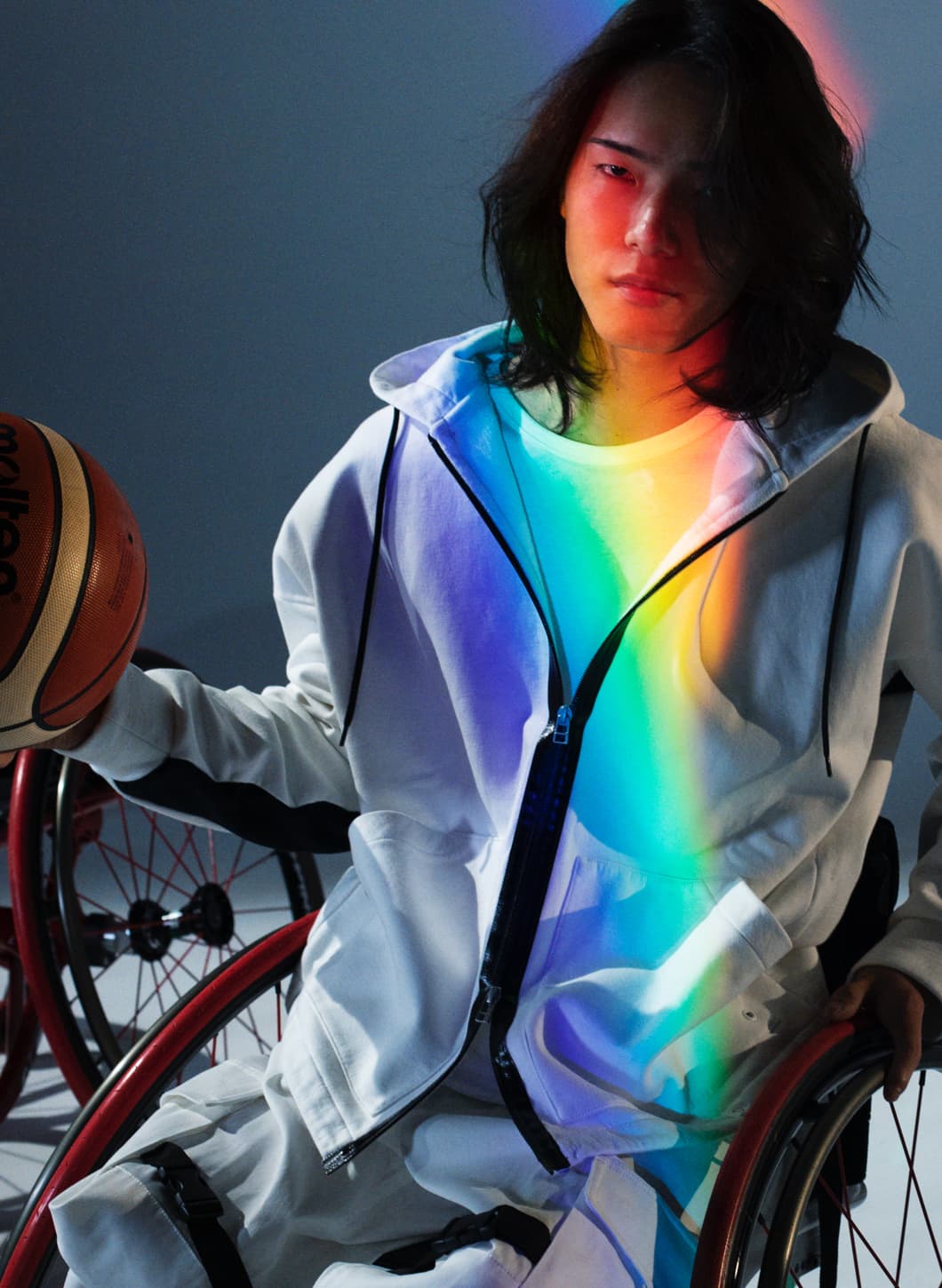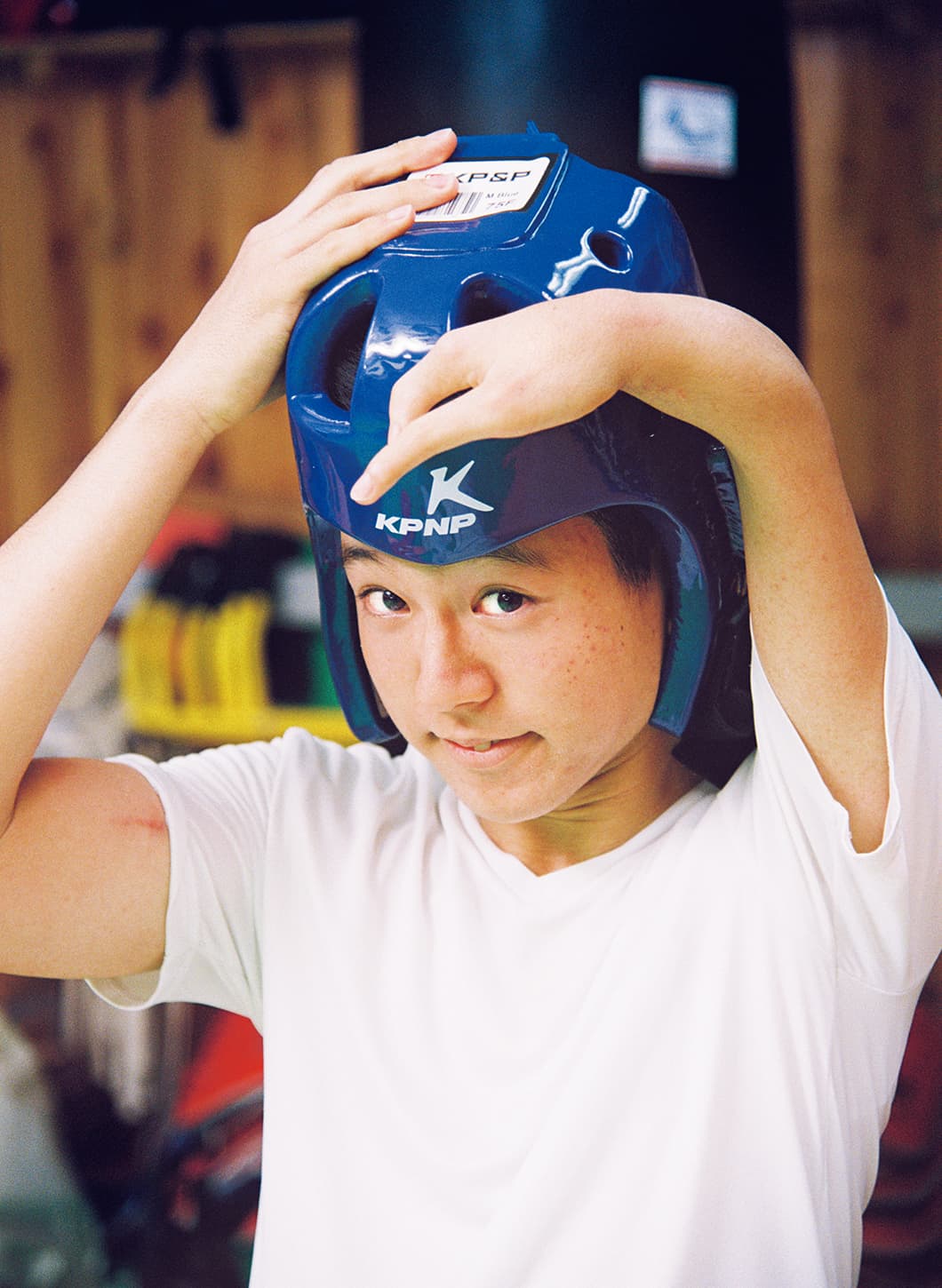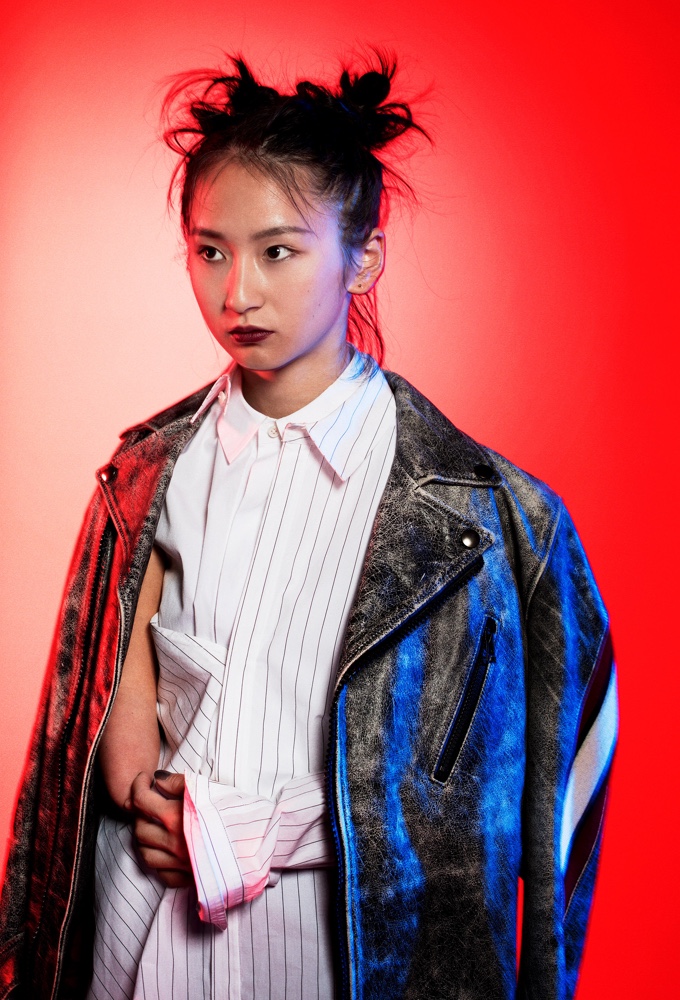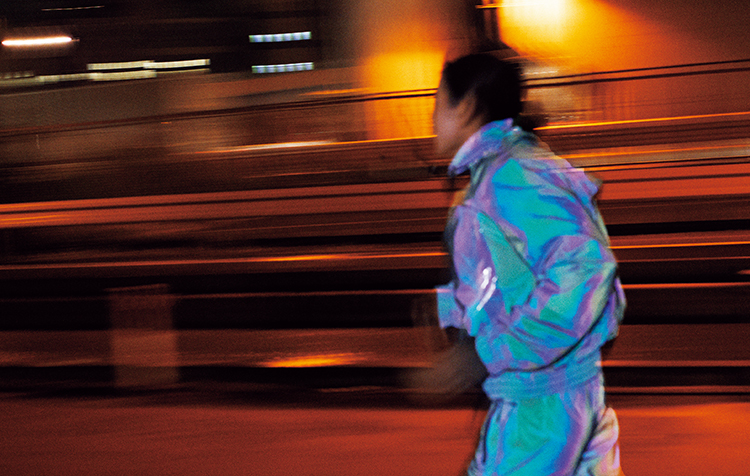
Yukako HATA
Triathlon
Photographs by Mika NINAGAWA │ Interview & Text by Senichi ZOSHIGAYA
- Fortitude, Borne of Human Connection
- How Triathlon Taught Her to “Let Things Go”
As many people probably know, triathlon is an endurance sport that consists of three events—swimming, biking, and running—one after the other in the course of a single race. It became an official Olympic sport starting in Sydney 2000, and an official Paralympic sport starting in Rio 2016. Though it is a fairly new sport, with athletes raising the bar on an everyday basis, it is also known as a lifetime sport, with people of a wide variety of age groups competing in the sport all over the world. Yukako Hata, who switched from swimming over to triathlon in 2013, and who is a Japan Triathlon Union designated training athlete, calls her discovery of triathlon “an experience that revolutionized [her] life and values.” We asked Hata—as someone who has trained for years to be one of Japan’s top athletes, and who has discussed this part of her life and her experiences through many lectures and appearances throughout the year—about the true appeal and potential of triathlon.
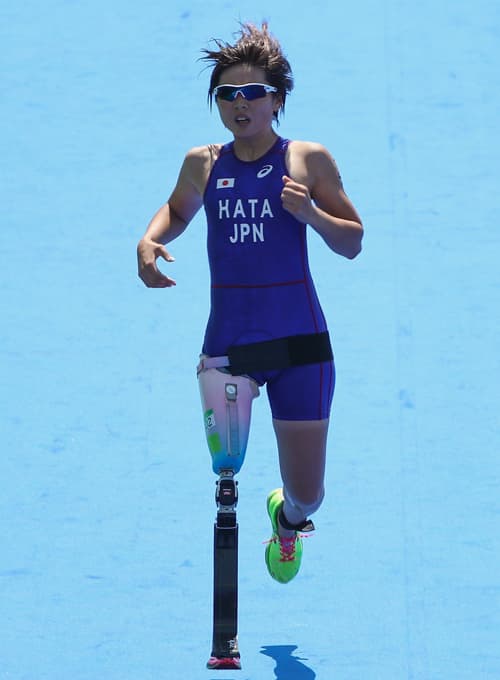
©Getty Images Sport
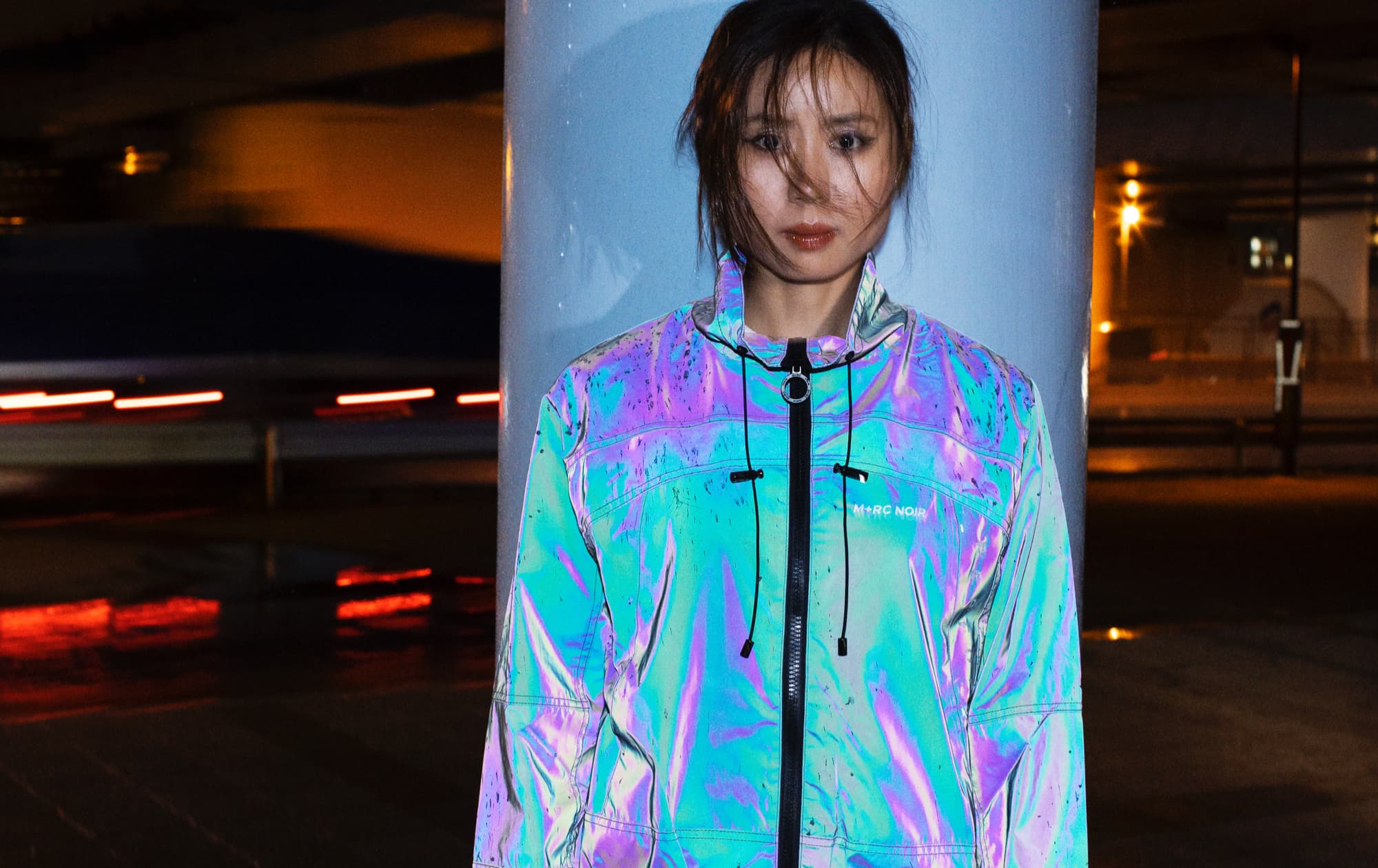
They all lived with impairment, just like me,
but it felt like they were living their lives without an ounce of shame or embarrassment.
but it felt like they were living their lives without an ounce of shame or embarrassment.
And seeing them like that… it showed me a new way to live, I think.
Meeting Her Comrades, and Feeling Comfortable About Her Prosthetic Leg
We heard that from the time you developed your osteosarcoma at 13 years old to your 20s, you lived a life completely devoid of sports.
I think the biggest reason for that was just a lack of information. At the time, the media almost never covered parasports, and of course the assumption, when it came to me, was that I wouldn’t be able to play like everybody else anyway, so I really had no option but to not do sports. The six years I spent in junior high and high school, I didn’t participate in a single physical education class, and I never even went to watch any of the school sports festivals. It was just so frustrating to see all these people exercising right in front of me. A lot of times I’d run into the nurse’s office crying, thinking why did this have to happen to me? I was just so embarrassed [of my prosthetic leg], so I didn’t want to do it. At that point, I didn’t even want to see other people exercising.
Did you talk to your parents or teachers about how you felt?
Yes, I did. But the adults around me didn’t know about parasports either, and the only thing they could really do for me was feel bad for me, that I wasn’t able to exercise anymore. I mean, looking back, being in that kind of environment was probably the entire reason why I lived a life so devoid of sports.
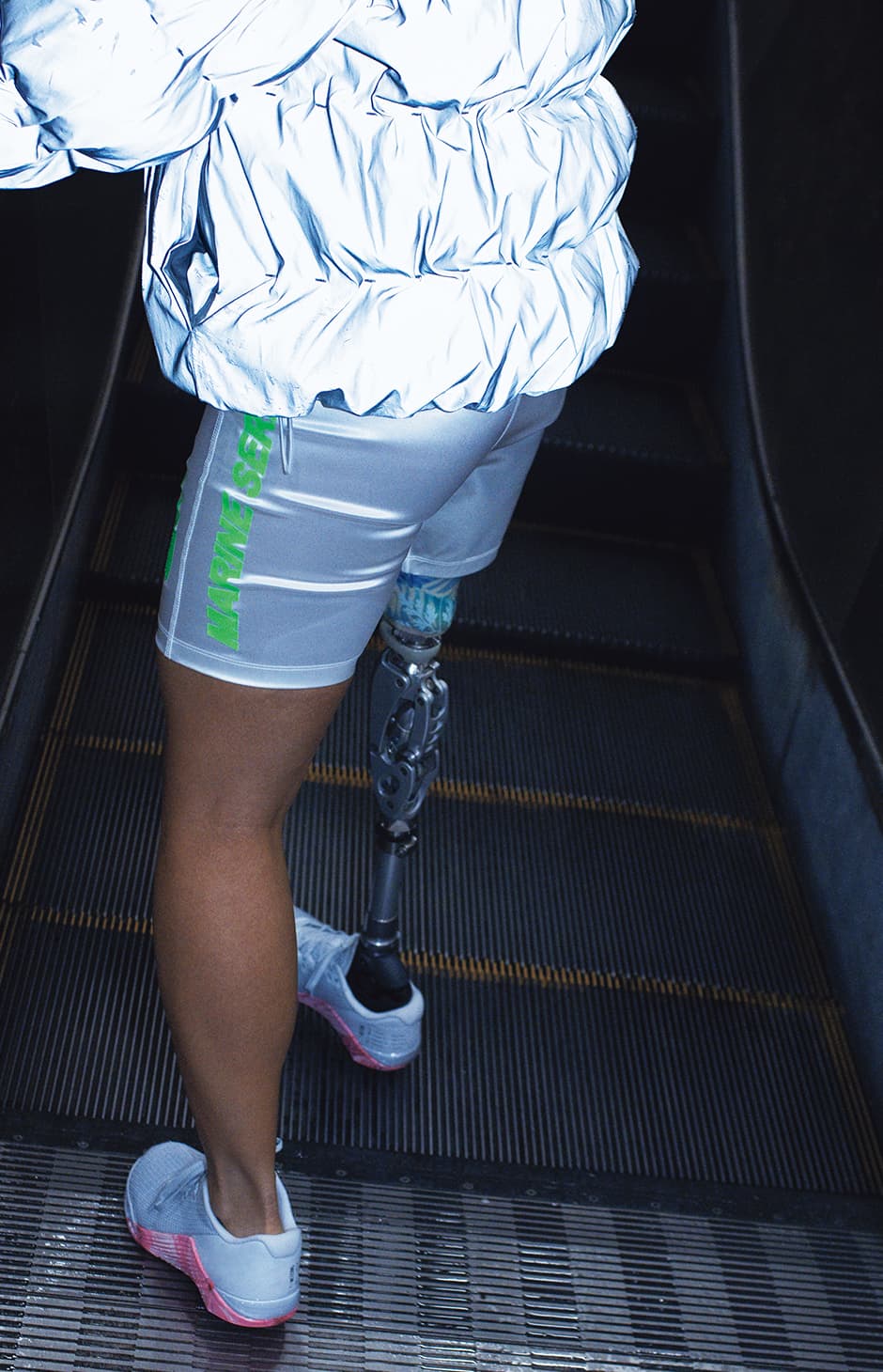
Later, after you got a job, you started swimming. Was there a significant reason why you decided to do that?
I’d always liked exercising. I swam in the ocean, for example, when I went on overseas trips as a student, and swimming was just the one thing that I really loved. Once I started working and had more time on my hands, I started casually going to a sports club. Even then, though, I’d change in the office instead of in the changing room with everybody else, and I’d creep into the pool, just hiding from everyone. And of course, that wasn’t fun at all [laughs].
So then I thought, I want to look for more people like me, and I went on the Internet and found this swim team for people with impairment, called the Chiba Miracles. This was my very first step into the world of parasports. I probably wanted to connect with people, ask for help, and in that way open up my life a lot more.
Did anything really change for you after you joined the Chiba Miracles?
Until then, I’d never had a friend with an impairment. So meeting the club leader was the first time I’d met someone with the same impairment as me, and of course, I also started to get to know people who were in wheelchairs, who couldn’t see, who couldn’t hear, who didn’t have hands. They all lived with impairment, just like me, but it felt like they were living their lives without an ounce of shame or embarrassment. Of course, I don’t know how they felt about themselves in the past, but at that point, at least to me, it seemed like they were all living these very full, energetic lives. And seeing them like that… it showed me a new way to live, I think, and made me feel like I could be like that too, if I could just change the way I thought about myself.
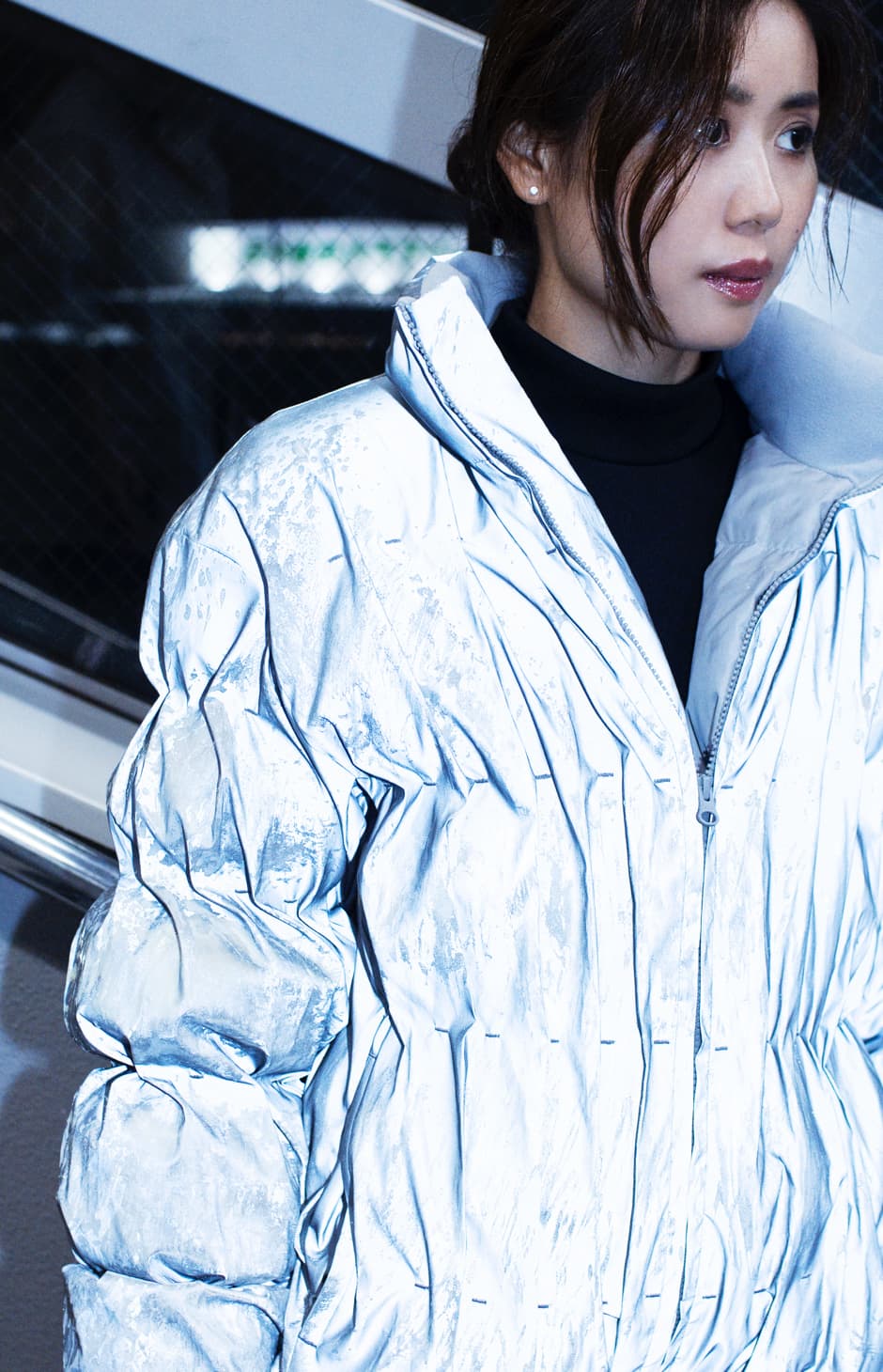
At that point, when you started swimming again, were you already thinking of doing para swimming competitively, or about the Paralympics?
I joined the Chiba Miracles in 2008, and in that same year, I watched the Beijing Paralympics on TV. It was right around the same time that I’d started participating in para swimming tournaments, and some of my teammates were even competing in the actual Paralympics. I was nowhere near that level then, but it made me just want to learn more about swimming. I’d taken swimming lessons before my illness, but obviously things were very different now.
So then I approached a coach I met at a para swimming training session hosted by the Kanto Swimming Federation for the Disabled, and they said, “If we’re going to do it, we should aim for the London Paralympics four years from now.” After that, I’d head to the pool from work every day and have one-on-one lessons with my coach, and I spent all my time training.
I started going to the Inage International Swimming School in 2009 as well for my morning training, and all of a sudden I was building up this environment where I could really aim for the Paralympics as an athlete.
How did you feel when your coach said you should aim for the London Paralympics?
This coach was really strict, to the point of it being a little scary for the people around them, and they really taught me what I needed to do and how I needed to think as an athlete, and how I should behave as well. I wasn’t originally an athlete, so I didn’t have much self-discipline or anything at the time.
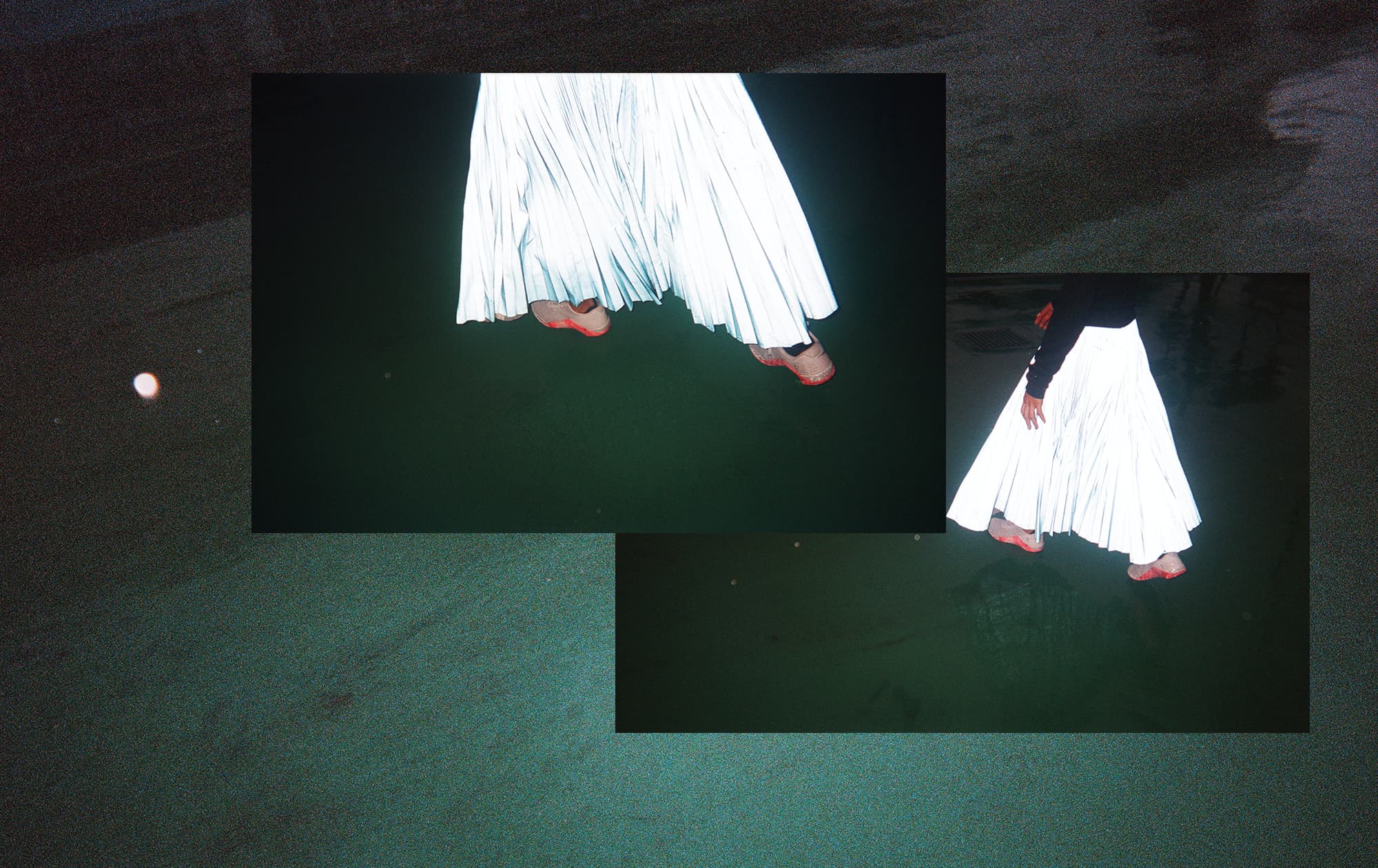
In the Athletes’ Village, people like me actually made up the majority, and the occasional able-bodied staff members were in the minority.
I felt for the first time the sort of walls and physical barriers that exist out in the world.
Switching to Triathlon:
What She Learned from the Rio Paralympics
What She Learned from the Rio Paralympics
You weren’t able to fulfill your dream of competing in the London Paralympics, but you did make the decision afterwards to switch over to triathlon, and begin a new athletic career.
My coach eventually became really busy, and we ended up parting ways in 2012. I wasn’t able to compete in the London Paralympics, but of course, I wasn’t going to give up and quit swimming. There were a lot of people who came to Inage International Swimming School who were doing triathlon, and as I watched them having fun, I became really interested in the sport. It was right around the time I was wondering whether I should try for the Rio Paralympics with para swimming, and it occurred to me that if I really seriously trained in triathlon—a sport that wasn’t popular yet in Japan—that I could be the one that could help expand its reach in the country. And so I decided to do it, what with all of the people around me encouraging me to do it as well.
I think the general consensus on triathlon is that it’s an extremely rigorous sport. Did you not feel worried at all when you decided to switch over so suddenly?
I actually thought it seemed fun. I guess from the beginning, I didn’t have any weird preconceptions about triathlon as a sport. I don’t think there are very many situations or environments that really drive you to start triathlon, and I guess if you don’t know about the sport, your first thought would be that it seems really difficult. I, on the other hand, was in an environment—the Inage International Swimming School—where it felt natural for me to start triathlon, and where there were a whole bunch of people who could teach me about it, so it was more like, well, I obviously need to do this [laughs].
What about triathlon drew you to it?
Swimming was something I’d always been good at, and I thought it was important for me to be able to continue that. But at the same time, I also felt like I needed something new in continuing my career as an athlete, and I thought if I did triathlon, I could keep doing swimming while also trying my hand at new things. More specifically, I thought that it would be fun and interesting to challenge myself and get better at a lot of things that I didn’t feel I was good at. Running and biking were very new things for me, and I saw a lot of potential for myself there.
In fact, there are a lot of people who come into triathlon from a different sport. I think this makes sense, considering swimming, biking, and running are sports that pretty much everybody has done at least once, and triathlon is something that really lets you utilize your strengths from these sports.
In fact, there are a lot of people who come into triathlon from a different sport. I think this makes sense, considering swimming, biking, and running are sports that pretty much everybody has done at least once, and triathlon is something that really lets you utilize your strengths from these sports.
You competed in your first Paralympics at Rio 2016, and came in at an incredible 6th place. What did it mean for you to compete in the Paralympics, as someone who wasn’t involved in parasports as a child?
That was the first time in life where I thought, I’m glad that I came to have this impairment. I was really grateful that I was given this place where I could feel that way, and I do think that if I hadn’t had that goal, I may never have felt that way for my entire life. And for me, the best thing was that it wasn’t just me—that my family felt the same way too. I think as parents they’ve always felt responsible for me and my life, and they’d always said after I got sick, “We’re sorry that we couldn’t give you a healthy body.” But when they saw me having fun at the Paralympics, I was able to tell them, from the bottom of my heart, “Hey, it’s okay. I’m so grateful.” And I think this was something that was really meaningful for my family.
You’d probably competed in many world tournaments, even before then. Did you feel there was something special about the Paralympics?
The thing that left the strongest impression on me at the Paralympics was the Athletes’ Village. I’d never seen so many people with impairment together in one place. I’ve lived my whole life as a minority in Japanese society, but in the Athletes’ Village, people like me actually made up the majority, and the occasional able-bodied staff members were in the minority. Maybe this is kind of a surface-level thing, but being in that kind of environment, where the roles were completely reversed, I felt for the first time why I’d had to live as a minority in Japan, and the sort of walls and physical barriers that exist out in the world.
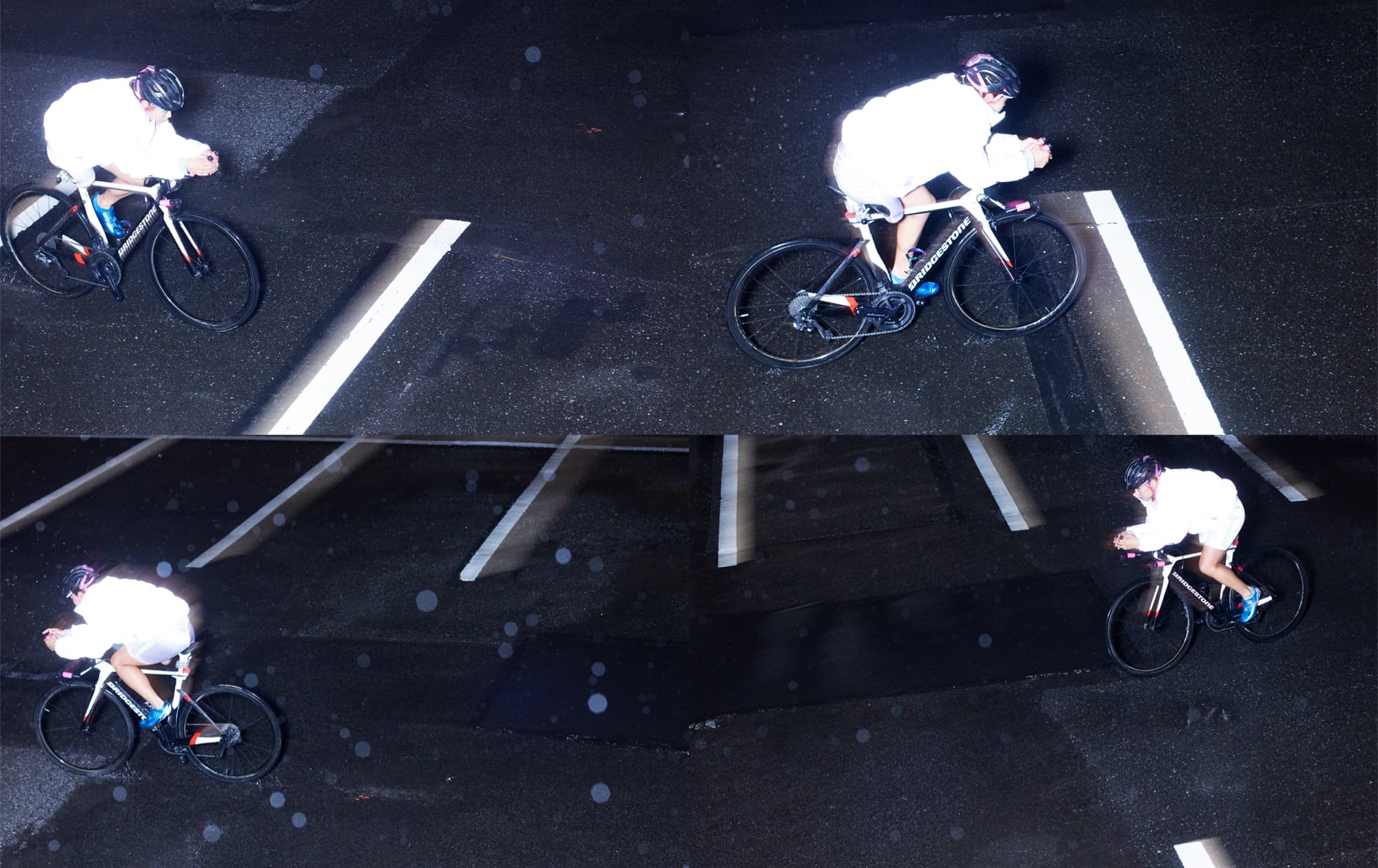
Something that people say a lot is
“When you start triathlon, your personality changes” [laughs].
“When you start triathlon, your personality changes” [laughs].
You become more generous around people, more open.
Day-to-Day Adaptation and Decision-Making,
and Valuing the Connections Made Through Sports
and Valuing the Connections Made Through Sports
Triathlon is a unique sport in that it’s held in the city, and is thus heavily influenced by the conditions of the city or natural environment where the events are held. What do you personally consider the most important thing with regards to your experience with triathlon?
Triathlon is a sport where your competitive ability is connected directly to your ability to adapt to your environment. So you have to compete in a lot of overseas races and learn the ability to adapt to all the changes and subtleties that the venues can throw at you. Getting into a routine doesn’t really help you, and in fact in my case can actually work against me, since I don’t like being tied down and not being able to adapt to changes in the environment. It brings me down emotionally. The best thing to do is to set up a plan, but adjust it for any circumstances that might crop up. If you watch the really good foreign racers prepare, you can see how important that really is.
In triathlon especially, things like temperature, water temperature, and wind speed on the day of the race can affect the equipment you want to prepare—meaning the trip to the venue, and how you spend that time, becomes really important as well. When I first started, I worried so much about every little detail, which can make you really anxious. Like if my prosthetic leg was even the tiniest bit wobbly I’d fix it, and if it was tilted in the wrong direction I’d feel really stressed. But amongst the really good foreign racers, there were people who weren’t like that [laughs]. They taught me that if the “fittedness” of my prosthetic leg doesn’t necessarily tie into better results, I should let go of it as something unnecessary, and try to find other points of efficiency and compromise.
In triathlon especially, things like temperature, water temperature, and wind speed on the day of the race can affect the equipment you want to prepare—meaning the trip to the venue, and how you spend that time, becomes really important as well. When I first started, I worried so much about every little detail, which can make you really anxious. Like if my prosthetic leg was even the tiniest bit wobbly I’d fix it, and if it was tilted in the wrong direction I’d feel really stressed. But amongst the really good foreign racers, there were people who weren’t like that [laughs]. They taught me that if the “fittedness” of my prosthetic leg doesn’t necessarily tie into better results, I should let go of it as something unnecessary, and try to find other points of efficiency and compromise.
It seems like it’s also a sport where you can very easily get swallowed up by your environment, and not be able to perform well at all.
Something that people say a lot is “When you start triathlon, your personality changes” [laughs]. You become more generous around people, more open. It’s a sport where, if you get too caught up in how things have to be, or in doing the same thing as everyone else, you can really not get anywhere at times. So I think in that sense, it’s a really good sport for people who tend to be more closed-minded. It doesn’t matter how hard you’ve trained to improve your performance, how well you’ve prepared—if you don’t have that adaptability on the actual day of the race, it doesn’t mean anything. I think that’s part of the fun of triathlon.
You’ve said previously that you want to work on your biking and running. What things do you place particular emphasis on in your day-to-day training?
Compared to the others on the world stage, I still have a long way to go in terms of biking and running. In the latter half of 2019, I made the decision not to use a prosthetic leg for the biking portion, and pedal with just one leg. Pedaling with both legs is faster, but I wanted to shorten my transition time, and so I spent a year switching over to single-leg pedaling. That actually really improved my biking time and has put me in a position where I can actually compete against the world’s top racers, which is an amazing accomplishment.
There’s a lot of equipment you can choose from in triathlon, and you have to decide whether or not you want to use this equipment as well. You just have to do a lot of research and be really decisive—thinking, if I try this for a while and it doesn’t work, I can just change it. Like, if I hear that a lot of more experienced racers are saying single-leg pedaling is better, the best thing to do at first is to believe it, and try it out.
There’s a lot of equipment you can choose from in triathlon, and you have to decide whether or not you want to use this equipment as well. You just have to do a lot of research and be really decisive—thinking, if I try this for a while and it doesn’t work, I can just change it. Like, if I hear that a lot of more experienced racers are saying single-leg pedaling is better, the best thing to do at first is to believe it, and try it out.

If there’s no right answer, and you don’t know how well something will work until you try it, it must be hard for you as an athlete to make your training more efficient.
I don’t think the full potential of prosthetic legs is being explored in a real way, so maybe if they do make a prosthetic leg specifically for bikes, it’ll be faster to bike that way. I’m the only person in Japan, so far, that’s worked with an orthotist to try to use an above-knee prosthetic leg while biking. But recently, after really thinking about how much time I have left until the Tokyo Paralympics, I made the tentative decision to go with single-leg pedaling.
My image of triathlon was a solitary sport that really tests a person’s mental fortitude. But it seems like it requires a lot of decision-making, in terms of choosing equipment and improving upon them, and situational adaptation skills that go beyond just a focus on the details. Hearing you talk about it, I feel like triathlon is an entirely different world from what I was expecting.
With triathlon especially, there are a lot of people involved in the equipment manufacturing process, and there’s no way we’d all be able to beat our records if our rivals weren’t trying new things all the time. It’s not a sport that’s self-contained, in the sense that you can’t just improve your record by training quietly all on your own.
Finally, is there anything you felt has changed with regards to society’s awareness of prosthetic legs, impairment, etc., since you started triathlon?
Starting triathlon gave me a real sense of attachment to my prosthetic leg, and compared to when I was creeping my way into the pool, I feel a lot more open now—like, I don’t have to hide it with a cover anymore. That’s just me changing, not my surroundings. But I think if I then go to the pool with my prosthetic leg, the people that see me there will start getting used to the sight, and gradually come to think that it’s nothing special. Gradually, any surprise, shock, or fear that was there will disappear. And I think now, it may be my turn to change the way people feel about impairment in that way.
Triathlon was something that revolutionized my life and my values. It expanded my connections with other people, made them stronger. And that’s something that makes your life richer as a whole. I think for me, it’s less about whatever society is doing or not doing, and more about creating more of the kinds of connections that I’ve personally made. So that whenever someone out there comes to have an impairment, or they become paralyzed, they’re able to think, “Oh well,” “It’ll work out.” For me, playing sports is about continuing to create these kinds of connections.
Triathlon was something that revolutionized my life and my values. It expanded my connections with other people, made them stronger. And that’s something that makes your life richer as a whole. I think for me, it’s less about whatever society is doing or not doing, and more about creating more of the kinds of connections that I’ve personally made. So that whenever someone out there comes to have an impairment, or they become paralyzed, they’re able to think, “Oh well,” “It’ll work out.” For me, playing sports is about continuing to create these kinds of connections.
Yukako HATA
Born in 1981 in Chiba Prefecture. Japan national triathlon representative (PT2). Member of Canon Marketing Japan, MARS FLAG Corporation, and Inage International Swimming School. Works at Canon Marketing Japan. Developed an osteosarcoma at 13 years old and had her right leg amputated above the knee. Started swimming in 2007 after getting a job, and starting 2010, began competing in many international tournaments as a Japan Para-Swimming Federation designated training athlete. Switched to triathlon in 2013, and came in 6th in the Rio 2016 Paralympic Games.

